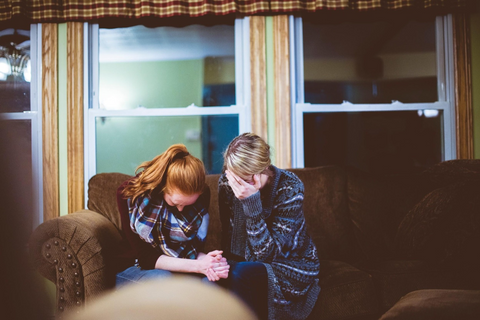Grief & Sleep: Tips to Help Sleep Better After Loss
Grief is an unfortunate part of life. As unfortunate is the way that grief inevitably ruins our sleep. Whether you are grieving the loss of an important person in your life or a pet, you likely have trouble sleeping soundly.
There is a psychological reason for the disruption of sleep while grieving. Many people have anxiety, depression, and even PTSD issues while grieving, which are well-known sleep disruptors. Other reasons for insomnia during grief include distressing and persistent thoughts when in bed.
If you are struggling to sleep while grieving, there is reason to hope. Sleep is a modifiable condition. A change in habit or addition of coping strategies can allow you to get the good night's sleep you need and deserve.
What is insomnia?
Insomnia is defined as “a sleep disorder that is characterized by difficulty fall and/or staying asleep.” Symptoms of insomnia include the inability to fall asleep, the inability to stay asleep, waking up too early, and not feeling rested when waking up. Most people experience these symptoms every once and awhile. In fact, occasional insomnia is very common.
Insomnia becomes a problem when it is a nightly occurrence, which is quite common in individuals experiencing grief. During REM sleep, our brains process the emotional consequences of our loss. This can result in dreams of the lost loved-one and trouble returning to REM sleep once the person has woken up.
Why do we need sleep?
When insomnia becomes chronic, it can result in sleep deprivation. Sleep deprivation is the state that occurs when we do not get enough restful sleep. Even one night of sleep deprivation can cause a person to be less alert and to lack the ability to adequately concentrate.
Being sleep deprived over a long period causes a number of health problems. These include
- Higher stress levels.
- More inflammation.
- Risk of Type 2 diabetes and cardiovascular disease.
- Anxiety and depression.
- Weight gain.
- Memory problems.
While all of the above symptoms are serious, the increased anxiety and depression especially affect our ability to cope with loss. Anxiety and depression often result from grief. When you don’t sleep, these symptoms can become worse and even keep us from working through our emotional pain.
Tips to improve your sleep while grieving
Obviously, sleep is a very important aspect of life and dealing with loss. In order to sleep better after your loss, follow these tips.
1. Exercise
It is hard to overstate the benefits of exercise in general, let alone for grief. Exercise creates a healthy immune system and can improve the sleep habits of everyone. For the grieving individual, exercise can be an amazing coping tool.
Moderate exercise allows you a way to process your hurt, pain, and grief. Just make sure to not exercise after 7 p.m., or it may have a negative impact on your sleeping. If you are sleep deprived, you will also not want to exercise too strenuously, as you can easily hurt yourself. Stick to exercise like a walk or hike, yoga, or leisurely bike ride.
2. Keep your bedroom sacred.
Our bedrooms should be our sanctuary. Most experts recommend that you only use your bedroom for sleep and sex. When the bedroom serves multiple purposes, it is harder to relax. You should never watch television in your bedroom, as it is much easier to become distracted and stay up far later than you meant to. If you have an indoor hutch or carrier for your pet, remove it from your bedroom.
Try to keep your bedroom between 65-68-degree Fahrenheit. You should also make the room as comfortable and inviting as possible. This means using comfortable bedding, attractive scents, and keeping the room free of clutter.
3. No electronic devices before bed.
Experts also agree that electronic devices should not be used at least an hour before bed. The light emanating from an electronic device inhibits your circadian rhythm. So, while you think that you are using the electronic device to relax, you are really suppressing the release of melatonin. Melatonin is the hormone that regulates sleep.
When you have grief-induced insomnia, it can be tempting to lose yourself in an electronic device. Netflix, Hulu, Facebook, and Twitter all provide opportunities to take us out of our own minds. This is not a bad thing, just make sure to wrap up your electronic device usage at least an hour before bed. Try reading an old-fashioned book by lamplight instead.
4. No caffeine or alcohol before bed either.
The National Sleep Foundation does not recommend using alcohol as a sleep aid. Yes, it makes you sleepy, but once your body metabolizes alcohol, it can actually disrupt your sleep. Caffeine, as well, is a problem for sleep.
To avoid insomnia, stop drinking caffeine and alcohol after 3 p.m. Also, be very careful about abusing alcohol or drugs, as these substances can lead to permanent changes in your sleep architecture.
5. Try yoga, massage, or mediation.
Relaxing activities like certain varieties of yoga, massage, or meditation can help you fall asleep. These activities are also helpful for dealing with and processing grief. Meditation especially can help manage the physical symptoms of grief as well as giving you more mental control over your mind and thoughts.

Conclusion
As you struggle with insomnia and grief, know that what you are going through is usual. Very often sleep problems accompany grief. But, it doesn’t need to be this way forever.
While it may be a long process, working through grief is an important part of life. Once you have begun sleeping normally again, it will be easier to honor your loved one’s life and even plan a remembrance for them. Follow the strategies provided above to begin gaining control back over your sleep and your life.







